Sat, 11 Dec 2004
Power Weather
Being called for jury service recently has sharpened up this
inquiry into domination. Jury service is at the discretion of the
state,
and since May 2004 in the UK, no one is exempt.
State power is like the weather, always there. We usually meet it
through
traffic lights, taxation, or speed limits. Jury service
brought me face to face with state power in a way analogous to
arrest and imprisonment. Report at a time and a place of the state's
choosing, go home each day but otherwise remain sequestered from
contact with anyone other than other jurors, to which is added, again
backed by the force of law, an insistence on complete confidentiality
about the whole business
of the jury's decision-making.
The force of law. This is what I lived with this last couple of weeks.
I was reminded that one of the ways of defining a functional state is
that it, or someone, has a monopoly on the use of force. In the
UK,
however much it may fray round the edges, the state does have such a
monopoly, while in Iraq at the time of writing, the 'coalition of the
willing' is failing to establish a monopoly of the use of fource, and
in
these days at the end of 2004, the incumbent monopoly of the Ukraine's
state use of force is under
severe challenge.
And how come, I ask myself, that nowhere in my education or experience
was there the slightest hint of any preparation for what a crown court,
or indeed any other court amounts to in practice? Once again it seemed,
the invisibility of power. Power weather.
So what did I see during my jury service? The first over-arching
impression is of theatre. The
frequent arrivals and departures of the jury from the court eventually
became more
than just analogous to a theatre curtain rising and falling. Each
time when we returned, the set and the actors would be there apparently
exactly as we'd
left them, even though on many occasions they had clearly come into
their places entirely for our benefit. A very odd discontinuity, like a
videotape
on pause being restarted.
In this Court Theatre the jury is audience. Silent. Attentive. The
focus of the whole
performance. And in a grand, even imperial isolation, with
communication,
except out of the room between jury discussion, strictly limited to
notes
given to an usher
who passed them to the judge.
As in any play, there was the sharp division of labour between the
performers. It featured highly ritualising jousting between counsel and
witnesses,
with the judge as referee and intermittent authority on what
was admissible. And, as could be inferred from palpable tension
between the judge and the defence counsel, more jousting was going on
behind the scenes, when during the frequent delays, what were described
as
'administrative matters' were being discussed. At the back of the
judge,
framing his authority, hung the royal seal, an huge enameled aluminum
casting, with one inscription 'honi soit qui mal y pense' discreetly
buried under the heraldic paraphernalia, and the other, perhaps held to
be
more important to the matters of the day, 'dieu et mon droit',
clearly visible. Hmm, I thought, both in French.
And the actors looked like actors in role, the judge be-wigged and
ribboned, ushered in with a loud knock by the door that brought the
court to it's feet. The counsel, also be-wigged and gowned, ushers
gowned in
black, much swearing by Almighty God on sacred books to tell the
truth, or, as only three people out of perhaps two dozen chose,
affirmation of a secular personal authority. There was constant bowing
by
court
staff to the judge, (or was it the royal insignia) as they entered and
left the court, Even more
curiously, if, as a jury was being 'processed' by an usher back through
these seemingly endless corridors of power to its departure hall, a
judge inadvertently
stepped into the space, the jury had to freeze, while he or she went on
their way. Was this British court in some state of arrested
development? Frozen in critical ways in some period of
royal privilege around the
end of the eighteenth or early nineteenth centuries?
After a day or two, I came to value the sense in which this 'theatre'
was an accumulation and
distillation of centuries of custom and practice, a situation where,
much though it grieves me to admit it, tradition has value. This was
reinforced by the judge's heartfelt endorsement at one point of the
value of trial by jury, which he hoped, quite out of context of the
business of the trial, would survive for a hundred years—hinting as I
felt, that it might be under threat. And it appeared to work well,
the defendant was found guilty on counts that, as it
then turned out, matched his 'previous', numerous convictions
and many years of imprisonment for similar offences.
So far so good, and it was good. And yet...
I suppose it was a virtue that I came to this trial with no experience
of the UK legal system except perhaps newspaper reporting of trials.
The
trial was considering allegations of rape, assault and false
imprisonment, early on, feeling this naivete, I looked up the 2003
Sexual Offences Act on the Internet—and found
this
account of the 2003 Act and the
considerable legal controversy around sexual offences. This Policy
paper reports that in the UK only one of 20 reported rapes
leads to a conviction and that only 10-20 percent of rapes are reported
to the police. The proceedings of the case I was involved in seemed to
show only too clearly why this is,
and why few women, already likely to be traumatized and knowing what a
rape case entails, would want to
endure it.
Nonetheless, the Sexual Offences Act 2003 improves how rape cases are
dealt with. As
of May 2004,
a complainant's previous sexual experience is no longer admissible, and
in the trial I write about here, the
victim support
police officers had evidently been very diligent, police facilities
included a
purpose
built suite for medical examination, and the police surgeon and some
other
expert witnesses in this trial were women. And yet, despite
all the apparent and tangible attempts to be scrupulous about
evidence and proof, not least the judges exemplary transparency about
the law and how it should be interpreted, I felt that, while the trial
was fairly
conducted, from
the
complainant's point of view, there was something fundamentally unjust
in the way this trial, and I'm supposing others like it, was
structured.
The defendant, as a person innocent until proved guilty is entitled to
do, made no statement when arrested and charged, and made no statement
in court, remaining a blank presence throughout. A face behind the
glass
screen of the dock. The complainant, having
made a long and detailed statement was taken through the key elements
of it by the prosecution counsel. The cross examination of her evidence
by the defence counsel, (both were women), explored the outer limits of
sarcasm, intimidation and character assassination. Maybe this is
normality but I was astonished at a
style
of challenge (challenge being an inescapable ingredient
here) that what in any other situation would seem to be clearly
abusive, over-determined and counter-productive. The defence
counsel's
questioning, ostensibly a
confrontation
of witnesses behaviour, was loaded with attitude, implying, while
hiding
behind courtspeak, that whatever the answer, the witness was a 'loser',
a 'liar', 'a drunk'. The defence counsel continued
this style with other female witnesses but notably moderated it when
when the several men were giving evidence. From a psychological
perspective, such an appeal is a trance induction, that invites the
jury to suspend their intellectual discrimination in favour of the
emotive 'suggestion' being proposed.
Here was where I began to get the sense of there being some
bias, a
lean in how rape is
dealt with. For all it's high quality as an event and the justice of
the
outcome, I felt it was seriously deficient. But how and where?
Early one morning I woke up unnacountably furious. Reflecting on why I
felt so angry led me to see that,
while albeit subtly nuanced and polished smooth with the countless
repetitions and challenges and reforms of the UK's legal history, the
court
process I was inhabiting was
yet another culture of domination. Male domination. The attack and
defense adversarial trial system amount to warfare, with it's
own Geneva Conventions and with rules of engagement of how combatants
must
be treated. Even if conducted by women who had joined it, this
was
male fighting culture resembling surprising closely a boxing
match
with rounds, and a referee who would
more often than not be male, only 15% of judges in the UK are women,
more. And
if I am correct that courts are a culture of male
domination, a form of ritualized warfare, why would women be
enthusiastic
about becoming judges?
Part of my anger was at realizing the extent to which even the
fairness and
justice of the courts is yet another dominant elite story told with the
intention of justifying and sustaining the existing distribution of
power. Be a poor person struggling to survive in an impoverished
neighbourhood, who had suffered substantial personal loss, a child
abducted, having to put down an elderly dog, with a lodger who appeared
to have killed or injured pets,
and it is immediately obvious that your story is a subordinate story,
not an elite story. Which means that it attracts derision and disbelief
from people who belong, or subscribe to elite stories of dominance. It
means that you
are a liar,
not just perhaps being from time to time, understandably,
defensively, evasive. For more on the elite and subordinate
stories of cultures of domination I again recommend
James
C. Scott's Domination
and the Arts of Resistance: Hidden Transcripts.
The elite storytellers in court were clearly identifiable, the expert
witnesses listed their 'qualifications' and some even listed
their publications, the counsel and judge wore wigs, anyone else was a
listener, a member of the public, or the jury, or a functionary, ushers
or court clerk. The
other people with subordinate stories, were also clearly identifiable;
the policewomen who packed and
wrapped evidence and got critical aspects of it wrong; the police
support officer who persisted in staying in contact with the
complainant. There were routinely, as it
seemed to me, abused by the hostile aggressive tone of the defence
counsel.
The adversarial system seems to be a win/lose warfare, a contest that
denies
negotiation
of the truth, People swear by Almighty Gods of one kind or another to
tell the truth, the whole truth, and nothing but the truth, setting out
right at the beginning the notion of absolute truth. But as any
psychotherapist or high energy physicist knows, the truth is highly
fluid and seeking to
establish it is more akin, as Lakoff, and Heisenberg have demonstrated,
to navigation
through an
ocean of metaphor. Because contrary to archaic folk theories about
truth built on such notions as 'facts' and 'objectivity', truth is not
susceptible to disconnection from human embodiment. Bodies don't lie,
though people may.
And here maybe is where the UK court system and
others too I guess are in another time warp, at least than me. Because
to think of facts as immutable, fixed, settled, to assert
absolute, literal
truths, is to be inhabiting a pre-modern, pre-psychological,
pre-Lakoffian
take on what counts as evidence. Juries on the one hand are charged
with weighing embodied imponderables, taking into account 'the whole of
the circumstances' as the judge more than once reminded the jury, but
the court process was wholly concerned
with what counts as a 'fact', with 'evidence', with the fruits of
intellect, with what what logically proves or
disproves something.
In this Crown Court discourse that I lived with for ten days, the clear
repeated
bias of the stories told was in favour of deploying argument,
inference and logical analysis to tell an overwhelmingly male elite
story—the truth is what is intellectually and/or scientifically
demonstrable. Embodied truth—emotionality due to life events, ie the
extent and effects
of shock, distress and damage due to the alleged injuries; 'presence',
the
ability to remain coherent and available
as a person through hours of very intimate storytelling and cross
examination—all this was persistently
discounted. The victim support police officer was repeatedly alleged by
the defence of having become 'emotionally
attached' to the complainant, of unprofessional behaviour—as though
support could be delivered without empathy.
And yet while the emotionality of the subordinate story-tellers was
discounted, or in the case of the complainant openly derided,
throughout the seven days of this trial, the defence counsel used
emotionally charged
language and tone of voice almost every time she opened her mouth. A
representative example of her defence counsel style that sticks in my
mind, was describing at one point the complainants underwear, an
uncontroversial exhibit, as 'her tatty knickers'. Unending strings of
closed questions loaded with negative inference strikingly resembled
artillery
salvos. They didn't seek to establish truth, their intention appeared
to
be inflict damage. Under the court's 'rules of engagement', i.e. that
returning fire was not allowed, they had the effect of suppressing
discussion, 'outlawing' any negotiation of the truth that was being
tested. And so sustaining the dominant elite/subordination power
relations.
My waking feeling of anger subsided into disappointment and sadness as
I realized that here again was a culture of domination that
discriminates in favour of
the privileged, the powerful, the articulate, and the qualified, and
against
the sad, the poor, the distressed, and people of modest financial and
social resources. And that it has sunk into relative social
invisibility.
I guess people have been saying this for decades, if not centuries, and
while the excesses of the past have been remedied, it is still not
right. In fairness I acknowledge that, when in this case, the
judge,
along with the rest of us found the complainant, terrified and shaking
in the witness box entirely inaudible, he organized for her evidence to
heard via video link. The shift in the balance of power was very
dramatic, without this rebalancing of the power relations, I felt the
court was in real danger of
re-traumatizing the complainant in the interests of justice. A
structural change, building on other recent changes to the
law, many of them, as the policy studies article I cited earlier
outlines, the result of decades of feminist
campaigning.
In conclusion: for all it's subtlety and checks and balances, in this
trial I feel I was a involved in
a form of warfare. We were participants in a court tradition that seems
not that far from the
jousting of knights, the commonplace ritual violence of the 14th
century European aristocratic courts. We were living in a
territory, a culture of domination, where as with other warfare, the
emotional, the embodied weight of injury, shock and
traumatization are discounted, left off-stage, because in the win/lose
adversarial paradigm the
court was locked into, they can't readily be reduced to facts. And also if you suffer from such 'weakness', for the elite story-tellers, whatever your standing, this colours you in as having a subordinate,
'loser' story.
There are 0 writeback comments for this entry
posted at: 06:48 | permanent link to this entry
Thu, 02 Dec 2004
Metaphor power
As I completed a previous day's blog entry,
God
Invades White House (a title that, having now finished reading
Esther
Kaplan's book With God On Their Side
seems to me very apposite) I was left with a sense
that those of us who might wear a 'liberal', 'nurturant',
'progressive' label, whether we chose it or not, have a special
difficulty
in contradicting or interrupting the very cohesive 'big ideas' of
conservative politics. A special difficulty due in part to our
preference for plurality, diversity and above all reflexivity.
I ended:
'...I
am
left
with a
troubling outcome to this line of inquiry.
Because they are often structured round a few
unifying, faith-based Big Ideas—
patriarchy,
or male
dominance—christian
conservative
groups seem more able than liberals
to agree on campaign strategies that favour a
narrow range of issues with which large populations can identify. Media
coverage that repeats such notions ad
infinitum through
interviews, photo-opportunities and commercials, amounts
to trance induction, and such spellbinding promises of 'security'
in the face of the inflated threats of a
'war on terror', can come to dominate political
discourse, as they did in the 2004 Presidential election.
If,
by
contrast, you favor a paradigm of human
relations that values diversity, plurality, nurturance, equality and
empathy, these generate multiple messages, multiple meanings, multiple
aims, that can seem incoherent en masse (though not necessarily
locally).
Politically this seems to me very problematic. How do liberal ideas
hold their place in the world without compromising their
diversity?
So a key ongoing element of this inquiry into domination is how
to
resolve this
dilemma. How can we create institutions, descriptions, naming,
metaphors, and symbols, that hold true to notions
of
plurality, authenticity, nurturance, empathy, caring and love? So that
they hold their value in contests where a handful of big ideas shaped
by covert notions of absolute truth are used to sustain and regenerate
control and dominance.'
Part
of an answer emerged
as I got this item ready for posting, when I
discovered George Lakoff's book(let)
Don't Think of an Elephant, written
for liberal activists in the US to use in the 2004 Presidential
election. Lakoff recycles his notions about 'Strict Father' politics
and 'Nurturant Parent' politics detailed in his previous longer book
Moral Politics—coming up with
recommendations about strategies for promoting 'liberal',
'progressive', 'nurturant' political notions. It's
short, cheap, direct and to the point, and worth every penny.
If
you want a taste of what George Lakoff has to say in
Don't Think of an Elephant ,
here are links to the online originals of several of the chapters.
A Man of His Words
George Lakoff talks
about how transforming the language of politics can help win the good
fight.
The Progressive Morality
If progressives communicate their
values clearly, most people will
recognize them as their own, and more deeply American than those
currently put forth by conservatives.
What's in a Word
The gay marriage issue is not just
about same-sex couples. It is about which values will dominate in our
society.
Metaphors
of terror
Reflections on 9/11
Metaphor and war Again
As in his father's
Iraq war, President Bush has
floated two powerful storylines to effectively, and dangerously, frame
America as both victim and hero.
Betrayal of Trust
Whether or not the
Bush administration lied is the wrong question to ask. The real issue
is betrayal of trust.
Other relevant articles by George Lakoff.
The
Power of Images
September 11 2001
Metaphor
and War:
The
Metaphor System Used to Justify War in the Gulf
I'll come back to all this. I include it in Satygraha because, much as
some of us would prefer it, it is not enough to devise ingenious
alternatives that contradict the top down givens of naturalized
domination, we have to be equally ingenious in finding ways of bringing
these institutions and propositions to the attention of the rest of the
world.
There are 0 writeback comments for this entry
posted at: 07:39 | permanent link to this entry
Wed, 24 Nov 2004
5am
I woke up early, my mind filled with Jason Burke's
recent
article about the Islamic fundamentalists' use of video as a very
modern weapon in their war with modernity in general, and the US in
particular.
Nothing particularly problematic in that, except in musing on his
conclusions—that some of the more extreme violence on video coming out
of Iraq was down to status games, competing for who could be the most
extreme—I found myself thinking of what else they could do to be more
extreme. In other words I'd joined them.
I take this as a signal that, however honorable it is to confront the
love of power—so astonisingly, transparently in-your-face present in
the US and its 'coalition of the coerced and the bribed' as
Presidential candidate John Kerry called it, to be in touch with it, to
feel it, to empathize with its victims (and for reasons of
confidentiality there is much else that I can't speak about here)—it
was time to interrupt (not end) this line of inquiry.
Why? I have learned over the last 15 years of trying to
confronting
the lovers of power in the UK psychotherapy community that there
can come a point in which active resistance morphs into resembling,
even reproducing, the object of resistance. In which making a good
piece of resistance, a very honorable thing in my book, we can
unconsciously join the oppressor, and in style if not in content, begin
to reproduce the oppression.
For example, some of the animal rights activists in the UK have moved
across this boundary to a point where elements of their activism
reproduce the violence that they are opposing. Employing domination in
the task of rolling back of domination is a lose- lose strategy that
undermines the rationality of arguments for ending the abuse of animals.
My waking images are a reminder too that the love of power drives out
the power of love. Something being demonstrated daily in Iraq where,
with that lack of innovative ingenuity that seems to be endemic in the
military-minded down the ages, the US forces enacting the removal of a tyrant
are only too visibly deploying the methods of the previous regime,
extremes of state violence, torture and stalinist style news management.
And so in this inquiry, sofar as the love of power topic has driven out
the power of love topic it is time to bring them more into balance.
There are 0 writeback comments for this entry
posted at: 06:40 | permanent link to this entry
Sat, 20 Nov 2004
Staying on the case
There have been times lately when keeping up this enquiry in the love
of power and the power of love have been emotionally onerous. Last week
was one of them.
I am trying to learn how to take note of events and evidence and not
necessarily to open up each topic. i.e. present them here with
images and links as a way of holding them in memory, as moments, points
in history.
Next week in the UK (November 22-28) is to be
anti-bullying
week. A government supported initiative to applaud, though
the impression could be gained from
this
offical site that
bullying only happens in school. Nevertheless, it's a great start.
Israeli
reprisals. B'Tselem reveals unprecedented scale of
house demolitions in the Occupied Territories
'How long does it
take to demolish a house?
It takes a year to build it. Sometimes a
hundred
years. And there are some houses that have always been there.
How long does it take to demolish a house?
Less time
than is spent thinking about whether it should have been demolished.
How much time is spent thinking about whether to demolish? Less time
than the ring of the phone ordering the demolition.
One shove and its gone. A hole gapes in the
familiar
landscape and the family that had substance and a name and an address
and human beings of all ages and relationships –has in the blink of
an eye become an example…
At night, no one sees where the destroyed
family has
gone. No one knows what they are doing now. And where they are
sitting now – in some corner, uprooted with their possessions,
under heavens empty and heavy, is anything being noted down about
them in some corner there now?'
This extract is from a new report just released by B’Tselem entitled,
"Through
No Fault of
Their Own" revealing that the number of houses demolished as a
punitive
measure in the Occupied Territories is twice as large as Israeli
officials claim. Ostensibly, the demolitions are aimed at Palestinians
who carried out, or were suspected of carrying out, attacks against
Israelis. In practice, the primary victims are family members who are
not suspected of any wrongdoing.
B'Tselem
is the Israeli Information
Center for Human
Rights in the Occupied Territories
Iraqi hostage(s) This was the
week in which Margaret Hassan appears to have been murdered in Iraq.
The emotional low point of the week for me was this item on the front
page of
US Today (14th
October 2004)
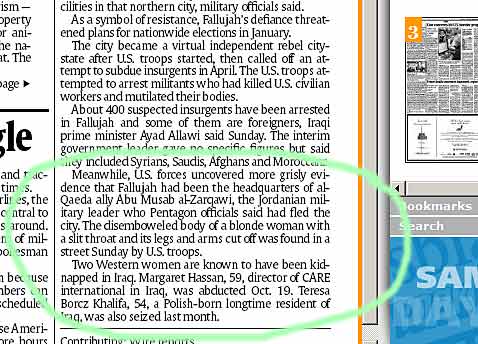
and then days of silence in the media when, having heard
there were two known western women hostages in Iraq, Margaret Hassan,
and
Teresa Borcz Khalifa, a Polish woman (who was
freed November 19th), I failed to find any mention of this murder.
Margaret Hassan was not blonde, so who is this woman? A week later I
have still found no reference to her death. And what does the level of
damage
she appears to have suffered tell us about the quicksands of despair
and hate that oppression
can generate?
155mm US Artillery firing on Falluja
155mm
is a little over 6 inches. The US forces were firing into Falluja
apparently from several miles out of town with this weapon. What
possible justification can there be for such indiscriminate
violence?
My concern at the repeated TV news footage of US
artillerymen firing several 155mm rounds a minute was echoed, it turns
out, by
BBC reporter
Paul
Reynolds, who also asked why:
I have questioned many times
senior officers here about the use of heavy weapons because they have
been using 155mm artillery in Falluja, they have been dropping 2,000
pound bombs. The bullets that they fire are high
velocity. The buildings are of poor construction here -
the bullets travel through the walls. And when they see what they
believe to be militants - and these marines are incredibly calm under
fire, they are almost unflinching - they do wait until they see a guy
with a gun but when they see that, they open up with everything they
have got and the question is, how much collateral damage is there going
to be?
Falluja casulties
Yes I know
these pictures from al Jazeera are hard to look at, both feature
children, but there are others
that are worse. And this last week images of the civilian casualties of
the assault on Falluja have been notable by their absence from the
newsmedia I see. Here is an
al
Jazeera report on civilian casulties early in the November
post-election assault on Falluja.
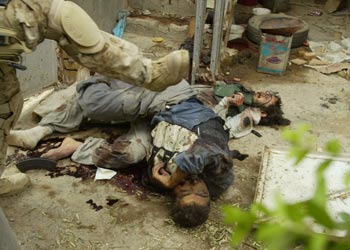

N.B. Despite American and Iraqi provisional government smears and
physical
attacks, Al Jazeera is an ex-BBC outfit that holds a very even-handed
Arab view of events in the Middle East.
US soldiers kill wounded men in
Falluja
The NBC video of US soldiers shooting a wounded rsistance
fighter in Falluja seems to have disappeared but these four frames
from
it...
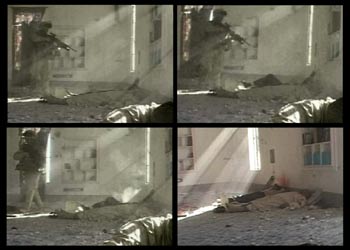
....convey the casual brutality of men so stressed out by training and
indocrination that they can see defenseless
wounded opponents as 'unmenschen', having 'lives
devoid of
value'... so that, as here inside a mosque, they can kill them.
Here from the blog of Kevin Sites, the freelance cameraman who filmed the shooting, is his
open letter to the marines involved.
Iraqi suicide bombers—who are they?
One of the features of the armed struggle going on in Iraq that seemed
to be entirely invisible to the media I read is the sheer numbers of
people who are prepared to kill themselves in opposing the US attack
and occupation. I haven't counted but it seems like more than one a
day, week in week out.
Is it possible that these men are remnants of
the Saddam Hussein regime? Why kill yourself to bring him back? If not,
how come these men have to wear the label 'insurgents', bought into by
all the media I read. Considering the numbers and frequency of suicide
bombing,
what a strange label, one that seeks to tell us that they are
'outsiders'—not indigenous people so infuriated by the violence of the
US attack and occupation that they are willing to kill themselves to
reverse it?
Perhaps, as other men have down the centuries, including the American
and British
troops occupying their country, they are dying for God and Country.
What else could this many men willing to kill themselves
mean?
As I have written elsewhere here, suicide bombing,
whether
at bus stops, in airliners, or cars, is a weapon that at a stroke
obsoletes the most fancy techno precision weapons of the alienated, if
courageous patriots, of the UK and US military.
Hunting
Yes, domination does sometimes seems to be an immovable a feature of
the
landscape and then, as with hunting, years of courageously indignant
people-pressure win through, and a corner of domination is rolled
back.

Amid bizarre scenes of procedural confusion, the UK Parliament voted
this week to stop the hunting of foxes for fun in the UK.
To appreciate fully why this is significant in the UK, you need to
understand that hunting is a remnant of feudal i.e. fullout baronial
domination, sustained by the rich and powerful in the UK for a thousand
years. The British royal family are blood
sports enthusiasts, and for social climbers and the landed gentry,
hunting has remained a jewel in the crown of the
seigneural/aristocratic tradition.
Hunting, with its ceremonial dress and the blooding of new recruits,
has always seemed to me an archetypal example of dominance in action.
The fight to keep hunting in the UK hides a covert agenda—"hands off
our
hereditary power and wealth".
The fightback, by the House of Lords, initially unsuccessful, will no
doubt be followed by other pressures from the feudal wing of the
Countryside Alliance. Labour's Baroness Mallalieu, who is also
Countryside Alliance president and who led opposition to the Bill to
ban hunting with hounds in the House
of Lords, said the Hunting Bill was "rank bad", adding: "Its
foundations
are naked prejudice and wilful ignorance, it is without rationality and
without principle". Comments that it struck me, apply only too well to
hunting itself.
Palestinian Child Deaths
Figures published 30th October
by
Al Jazeera appear to show that the Israeli
Defense Forces [IDF] are killing an outrageous number of Palestian
children.
In
October 2004, the number of children and minors under 17 killed by the
IDF has
climbed to 33. An Israeli officer, who in
October shot a 12-year-old Palestinian child
in Rafah in southern Gaza 20 times to ascertain that she was dead, was
arrested briefly but only on
suspicion that he lied about the incident.
Many, or most, Palestinian children killed have been on their way to
school or have been have been imprudently stoning the Caterpillar
Inc. bulldozers that demolish their homes.


There are 0 writeback comments for this entry
posted at: 08:08 | permanent link to this entry
Fri, 05 Nov 2004
God invades White House
'... surveys have shown, that many more Americans
believe in the
Virgin Birth than in Darwin's theory of evolution.' The
Day the Enlightenment Went Out By GARRY WILLS nytimes.com/2004/11/04/
The 2004 US Presidential election has seemed to have obvious relevance
for
this
inquiry into love, and its antithesis, domination. I've already made
three tries to find
a voice that is up to the task of
writing about it. They all ran into the sand. Too
reasonable. Too even-handed for the amount of feeling that I and lots
of other people had running, both before and after the US election.
1. Satanic
Theology
For months past I've been digging into what various people have had to
say about fundamentalism,
an
article by Karen Armstrong, her book,
The Battle for God, and Almond,
Appleby and Sivana's summary volume,
Strong
Religion of a huge, 10-year, US funded, research study into
fundamentalism
world-wide, that
includes details of the origins of such groups across America.
Here are some headlines.
World-conqueror
In the
world-conqueror pattern we see the most
virulent type of
fundamentalist movement in terms of the disruption of a previous order.
....The world, a realm of Satan
and
darkness, must be overcome if not brought back into the fold. Its
institutions,
structures, and values must be brought under the control of the true
believers. Strong Religion p151
Rolling back Secular Humanism
[In the US] The
shift
to an
operative
postmillennialism—the
belief that Jesus would
come only after Bible-believing Christians had prepared the way by
inaugurating the era of righteousness on earth—was triggered by the
moral and
social crises of the 1960s. ... Bible-believers could no longer wait
passively for Jesus
but must protect the next generation of Christians by concerted
political efforts to "repeal" or "roll back" secular humanism...
...Falwell
and his associates in the Religious Roundtable
and other Christian Right lobbying groups pushed Protestant
fundamentalism toward a new, world-conquering pattern of political
activism in
reaction to the threatening pluralism of belief and lifestyle that
appeared to be
overtaking "Judeo-Christian" America. Strong
Religion p156
Theocratic politics
The first wave of
this new
political activism, designed to "take back"
the courts, schools, and Congress from the secular humanists (and,
presumably, to vanquish them or at least diminish their role in public
life),
was active during the Reagan presidency and followed a strategy of
applying
pressure at a national level. A second wave, inaugurated by the
Reverend Pat Robertson's Christian Coalition in the late 1980s and
1990s,
profited from the lessons of the Moral Majority era and focused its
impressive and far more successful political activism on local
politics—state
assemblies, school boards, state political parties. Strong
Religion p156
A bid for power
The growing conviction of Jerry
Falwell,
Pat Robertson, Randall Terry, and Tim LaHaye in the late seventies as
to the possible
emergence of a Moral Majority, likely to acquire hegemony in American
politics and
culture, made them introduce a "postmillennial window"' into their
premillennialism. They assumed that the arrival of the millennium
depended upon their activism. Tribulation would precede Rapture, not
follow it.
In consequence, one should act immediately in order to better American
society, otherwise devastation would be so comprehensive as to hit the
saved as well, and anyhow, it might be so cataclysmic as to render
reconstruction extremely difficult. Only a daring bid for power, until
then thought to
be an un-Christian course of action, could save the day. Strong
Religion p70
After sifting what felt like a small galaxy of stuff on fundamentalism represented
here by these quotes and my
earlier article, I
realized
why I, and a lot of other people, not least the liberal-leaning inhabitants
of
the US, were so wound up about the 2004
US Presidential election result. It seemed
to point to a threshold being crossed:
As Sister Joan Chittister OSB writing of the 2004 Presidential
election puts it.
I would call it a warning, a
signal of things to come, the
klaxon of what is clearly a crossover moment in time, perhaps, but not
a real profile of the historic American character and hopes....
...we did not, in this particular
political exercise, see the
fundamental ideals of the American public -- respect for differences,
separation of church and state, the common good, and justice for all --
in full sway. We did see ideology at its most punishing, smothering and
narrow worst.
...what we saw is what extremism
looks like, what cultural
evolution looks like, what fear looks like, what religion run amuck
looks like. We saw radical right fundamentalist religion pitted against
the most shameless definitions of secular liberalism as weak, immoral
and irresponsible. It was the battle of two one-eyed monsters writ
large. No nuances. No common ground. No common sense. No real
evidence.
Joan Chittister, OSB
God invades
White House
2. Enough of facts - my mind is made up
The 2004 US Presidential election result appeared to show that
since 9/11 a majority of the
American people have bought
into a patriotic loyalty oath promoted by the US administration. One
that entails believing in a '"war"
on
terrorism'; Iraqi possession of 'weapons of mass destruction';
Iraq as a complicit in the 9/11
attacks; and calling the attack on Iraq a "war". Aren't these fictions?
Aren't they blatant pieces of trance
induction intended to consolidate the power of the Bush administration
through further terrifying the
American
population and marginalizing and denying
dissent?
The Power of Nightmares,
the BBC2 series by Adam Curtis, (
video
Part 1, Part 2,
Part 3)
offered
almost three hours of
video evidence that this was a plausible explanation. If so, how come
so many
people signed up to
this apparent failure of common-sense?
And then I remembered that the fundamentalism studies had shown that many millions of committed
church-goers in the US, perhaps 30% of the population, live within the
'enclaves' of a variety of forms of christian
fundamentalism. Through owning and controlling churches, schools, home
schooling, colleges, publishing, broadcasting, and in
some areas, even shopping, the enclaves seek
to be self sufficient. What I hadn't appreciated was that such enclaves
are a way of ensuring
that people of faith are actively
out of touch with other ways of being in the world. The
enclave is a vessel of faith, of righteousness, and the
god-less outside world is perceived as 'bad', even 'evil', to be
avoided. Political
choices within this cultural deafness filter down through charismatic,
male,
authoritarian,
local or national religious leaders, and are re-enforced by a vast
christian media
network.
Ostensibly such enclaves,
a key element of
fundamentalism everywhere, are defending themselves from
the moral
decay
of pornography, sexual freedom, political correctness, gay
rights,
feminism and the free-wheeling liberal critiques of secular
institutions such as governments, universities, science and
publishing. A closer look suggests that christian resistance to being
over-run by liberal values has
less to do with a perception of moral disintegration, and much more to
do with holding on tight to
a short list of the
specific moral values that they have selected from the Christian story
book;
especially patriarchal
male
dominance, the
subordination
of women
and the un-naturalness of homosexuality, and alongside these, the idea
that the nature is a resource to be exploited.
The 2004 US Presidential election appears to have been won as this BBC
report confirms, on the basis
of
large
numbers of christian conservative voters seeing George W. Bush as
embodying these selected
'moral values'.
God invades
White House
3. Unpicking the power of
righteousness
In the task of understanding the 2004 US presidential election
result, research into the moral values of
christian fundamentalism has been vital. What
feeds and sustains such values? Yet another strand of American
research, this time by cognitive
scientist and linguist George Lakoff, shows
how
notions such
as 'moral values' are human
constructions, rooted in the human capacity for metaphor:
Moral order is based on a folk
theory of the natural order: The
natural order is the order of dominance that occurs in the world...
God is naturally more powerful than people
People are naturally more powerful than animals, plants and
natural
objects
Adults are naturally more powerful than children
Men are naturally more powerful than women. Lakoff Moral Politics p81
The consequences of the metaphor
of moral order are enormous,
even outside religion. It legitimates a certain class of existing power
relations as being natural and therefore moral, and thus makes social
movements like feminism appear unnatural and therefor counter to the
moral order.It legitimates certain views of nature, e. g., nature as a
resource for human use, man as steward over nature. Accordingly it
delegitimizes other views of nature, e.g., those in which nature has
inherent value. Lakoff Moral Politics p82
In addition [the
metaphor of moral order]
focuses attention on questions of natural superiority...
there are people (typically wealthy people) who believe that the rich
are morally superior to the poor. Indeed that belief is explicit in
forms of Calvinism, where worldly goods are a reflection of
righteousness. Lakoff Moral
Politics p83
Might
the
heightened awareness and level of feeling that many people have about
the
2004 US
Presidential election amount to some intuition that
we are living through
a critical point in history. One where the "morally superior" rich of
America, led by a
charismatic (and Calvinist) leader, license themselves to further
institutionalize a belief in the equivalence of righteousness
and wealth? Have we reached a
threshold where
we
realize, to our horror, that the Bush administration is leaving behind
secular,
liberal plurality; leaving behind justice,
negotiation, and the rule of law;
and is intent on installing a 'Kingdom
of the God-fearing'?
I'm reminded of a New Yorker
cartoon where, as Adam and Eve
disport themselves in the Garden of Eden, the hand of God, waving a
warning finger, reaches out from the heavens, and a voice declaims,
"Rule No:1
don't piss me off". This seems to epitomize
the Bush administration style. Well hidden
behind often Orwellian language (The "Clear
Skies Act 2003" licenses industry to pollute - The"Healthy Forests
Initiative"
licences the damaging clear-cutting of forests) are the
god-given absolutes of biblical
inerrancy. These highly selective fear-laden fragments of the Christian
story cascade down through layer on layer of authoritarian,
patriarchal, (and usually male) leaders, to
terrify other,
subordinate creatures, and
thus much of the rest of the
world, into compliance with American interests.
God
invades White House
4. Holding the Big
Picture
Was the distress many of us felt
about the Bush re-election due to it seeming to threaten the
negation of so many of the socially vital gains of recent decades?
Or as I fancy, is it more a matter of two
steps forward, one step back?
Am I taking refuge here in
ungrounded optimism, some resuscitation of the much derided
notion of 'progress'? Perhaps, but I am old enough to have seen a
major
over-arching development in recent decades—the
evolution in attitudes to childcare. Childcare has moved away
from the fear-filled
alienation of authoritarian control—toward nurturance and
gentleness—meeting the child's needs rather than controlling their
behavior, (the UK, trailing other
European nations, is even legislating to criminalize
smacking children).
Along side this in the last 30 years I have seen the
gradual emergence into
public consciousness of child abuse,
neglect,
bullying, paedophilia,
and
domestic
violence.
All of which
amounts to a raising of consciousness about
domination, albeit haphazard and fragmentary, and often highly
contested. But I have the sense, looking at the 'big picture', that
history is inexorably moving in this direction,
If you are skeptical, I recommend Lloyd de Mause's History
of
Childhood, which shows extremely convincingly the
historical
trajectory from astonishingly abusive
parenting, toward more
caring, more loving, more child-centered approaches to upbringing and
child-care. With, as a likely consequence, the moderation and/or
marginalizing of
domination. Locally it can be hard to see but
generationally it seems to be a notion that has legs.
God invades
White House
5. The politics of
identity demolition
De Mause's psychohistorical approach
has been complemented
by George Lakoff's notion of two divergent parenting styles that he
details in Moral Politics,
see this article for
a brief account. He calls
them 'Strict Father' parenting and 'Nurturant' parenting, and
he equates these with a
conservative and liberal politics that correspond to each parenting
style.
Christian
and islamic
fundamentalism both appear to to
enthusiastically
endorse 'Strict Father' parenting i.e. patriarchy.
Here
are a couple of
items from a modern (1972) christian child-rearing manual:
The spanking should be
administered firmly. It should be painful and it should last
until the child's will is broken. It should last until the child is
crying, not tears of anger, but tears of a broken will. As long as he
is stiff, grits his teeth, holds on to his own will, the spanking
should continue. (Hyles, How to rear
Children pp99-100 in Lakoff: Moral
politics)
Obedience is the most necessary
ingredient to be required from the
child. This is especially true for a girl, for she must be obedient all
her life. The boy who is obedient to his mother and father will some
day become the head of the home; not so for the girl. Whereas the boy
is being trained to be a leader, the girl is being trained to be a
follower. Hence, obedience is far more important to her, for she must
some day transfer it from her parents to her husband. . . .
This means that she should never
be allowed to argue at all. She should
become submissive and obedient. She must obey immediately, without
question, and without argument. The parents who require this have done
a big favor for their future son-in-law. (Hyles, How to rear Children p158
in Lakoff: Moral politics)
Such 'Strict Father' parenting naturalizes domination and
subordination,
and as Lakoff shows in this
article, it shapes conservative
political beliefs in the US.
My guess is that part of the considerable distress and alarm that
many people such as myself have felt around the re-election of
President Bush, is
that it signals a move toward the
consolidation, and even extension, of the
'shock and awe' of America's 'full
spectrum dominance', at home and abroad, 'strict father' politics.
However, as the 'strict father' approach to childcare gives way to a
more 'nurturant' approach, many people sense
intuitively that
the expressions of ('strict father') 'family and moral values' that
shape the Bush Presidency are
facing
backwards in history.
They are in regression from a secular plurality
where, unencumbered by patriarchal theology, a rich variety of social
movements such as feminism, minority rights, gay rights, abortion
rights,
racial justice, innovative spiritualities, and ecological
awareness, have gained legislative and popular recognition. What these
movements have in common is that they roll back the 'folk theory' of
the naturalness of domination, especially male domination, perhaps
most effectively and essentially, in child-care.
And on the other side of the coin, exactly
these developments appear to be
anathema to fundamentalist christian church-goers.
Fundamentalist enclaves see these secular expressions of 'modernity',
or
as I would fancy 'post-modernity', as a revolt against God. And if you
are a person of faith, who "bears witness", "walks with the Lord", "is
busy harvesting souls", or "excising the cancer of deviation,
sexual
or otherwise", a revolt against God is the ultimate challenge. Why?
Because it threatens identity demolition. Faith, like the optimism in
this text, is an investment in a big idea, a "Yes". If
significant doubt arises,
such a 'Yes', can
morph into a "No".
If your whole identity is invested in the "Yes" of christian
or other fundamentalism,
based on the
inerrancy of biblical texts, then
de-construction or
questioning of this faith has to be strenuously resisted. After
all, none us want to 'go out of our minds'.
God invades
White House
6. Echoes and
resonances
For US christian conservatives, the secular values of plurality,
diversity, negotiation and power-sharing do realistically threaten
identity demolition.
American christian enclaves have reacted to these
perceived
challenges
to their faith with
the classic characteristics of fundamentalism world-wide. They have selected scriptural items that
support the present controversies while neglecting others, adopted moral manicheanism, signed up to absolutism and inerrancy, and framed the struggle
as
millennialism, the end of
history.
Selectivity
Protestant
fundamentalists of the United States select the
apocalyptic prophesies to be found in the books of Daniel and
Revelation... p94
...fundamentalism selects some aspects
of modernity to
affirm and embrace. Much of modern science may be accepted, for
example, and modern technology such as radio, television, VCR's
audiocassette tapes, telephone banks, and modern mailing techniques are
effectively employed. p95
...fundamentalisms select
certain consequence or processes of modernity and single these out for
special attention, usually in the form of focused opposition...
abortion in demand in the United States. p95
Moral Manicheanism
A
dualistic or Manichean worldview is one in which reality is
considered to be uncompromisingly divided into light, which is
identified with the world of the spirit and of the good, and darkness,
which is identified
with matter and evil. Ultimately, light will triumph over darkness. For
fundamentalist movements, as we have noted, the world outside is
contaminated, sinful,
doomed; the world inside is a
pure and redeemed "remnant." p95
Absolutism and Inerrancy
Fundamentalists...
share a recognizable approach to
religious sources. First, they steadfastly oppose... ...the
canons
of critical rationality as defined by outsiders. Instead of following
philological
or historical methods, fundamentalists employ their own distinctive
strategies of interpretation, including "hardened" and "updated"
traditional
approaches, designed in part to reify and preserve the absolutist
character of the
sacred text or tradition. p96
Millennialism and Messianism
History
has a miraculous culmination. The good will triumph over
evil, immortality over mortality; the reign of eternal justice will
terminate
history. The end of days, preceded by trials and tribulations, will be
ushered
in by the Messiah, the saviour.
Do you find echoes and resonances between the
2004 US presidential election and these
headlines from the
ten year study of fundamentalism
around the world
into
christian fundamentalism? Here are some further
quotes
from that study
that may account for the sense of urgency that has energized the
christian right
in recent years.
American
fundamentalists see the United States as the third
concentric circle of their "moral landscape," beyond their own
independent church and the loose network of churches to which they
belong (Baptist Convention, Liberty University graduates, etc.).
America is of course endowed
with a theological dimension (as the City on the Hill),... ...The fourth
concentric circle is the Middle East, with the Holy Land as
its hub and the war theater of the Apocalypse. The prophetic landscape
depicted
in the Books of Ezekiel, Daniel, and Revelation saw its veracity
confirmed
by the strategic role of the Middle East in the international arena
over
the last quarter century. Cosmology has suddenly been endowed with a
down-to-earth significance. (106) Strong
Religion P73
Often, as noted above, the
movement
really gets off the ground only when a cataclysmic, transformative
event
occurs either within the movement itself or, more likely, in the local,
national, or international environment external to the movement. The
trigger creates
a new set of circumstances that provides an opening for a
fundamentalist movement to expand and assert itself under the guidance
of a
charismatic authoritarian leader." Strong Religion p135
God invades
White House
7.
Death of the American dream of
invulnerability
Initially
I bought into the trance induction
of accepting the appalling 9/11
damage as an unprovoked attack on the US by Islamic
terrorists.
That was how it looked. And
then, as
day by day the media built up the posture, constantly reinforced by the
Bush administration,
that the
US was an entirely innocent victim,
the
trance bubble popped. as
though US complicity with oppressive authoritarian regimes in
Egypt, Iraq, Saudi Arabia, Iran and Israelestine were not part of the
historical record. A
huge store of goodwill was
sacrificed.
Then followed the acting out of revenge on
Afghanistan, one of the poorest countries on earth—and so recently an
ally against a previous 'evil empire'—the
USSR (check
out Stallone's Rambo 3 for
details) and not long after, the illegal attack on Iraq. In a massive betrayal of trust,
the
Bush US administration followed, and
later (Iraq) exploited, a political need to rationalize
the newly exposed vulnerability of the US and justify vengeance. Rarely
in
history can 'persecutor' have reversed into 'victim' and back to
persecutor so quickly,
From the perspective of several years on, 9/11 looks like an incident
in
a war of attrition between fundamentalist ideologies, christian and
islamic, that has been going on since at
least the
Iranian hostage
crisis and Beirut bombings. The two ideologies seem to have much in
common, not least profoundly
misconstruing each other. Islamists see the US as the epitome of a
satanic modernity that is a threat to the Koran based culture.
Since
9/11, the
US
has behaved as though the
modern
methods of fundamentalist islamists such as Osama bin Laden and al
Queda posed a
critical challenge to the US world hegemony. As though the overwhelming
asymmetry of
wealth and resources didn't exist.
I have to keep reminding myself
that fundamentalism is archaic only in it's beliefs, in its
methods it is typically highly innovative and indeed persons willing to
kill themselves, and thus make routine objects such as home videos, cars and planes
into very lethal weapons, are very modern form of weaponry.
So, following 9/11, in the US and al Queda, we
appear to have two opposed fundamentalisms each out to undermine or
destroy the 'modernity' of the other.
However if we pop the trance bubble of feeling equally terrified of
both of
them, what we see is a gigantic
asymmetry, the stupendous technological power and might of the world's
only
superpower
severely challenged by the strikingly modern innovations of al
Queda's networked autonomous cells and
suicide bombers. But, as I have learned to appreciate,
(see BBC2 The Power
of Nightmares
video
Part 1, Part 2,
Part 3)
while
undoubtedly
posing some risk,
the
fear of an Al Queda attack has been hugely
inflated
for
political reasons
by
the US and British administrations.
It is not difficult to see how the US would
see such critical innovations
as suicide bombers as doubly threatening, because
ultimately
there is no secure
defense
against them, thus key aspects of US
technological
might
are
rendered obsolete
overnight. And of course it is not only the opposed
forces that are asymmetrical, the level of damage, however painful to
us,
in New York, Madrid, Bali and Morocco, is as nothing caused by the
generational damage wreaked by the US,
think Philippines, Vietnam, South America, Palestine, Iran, or Saudi
Arabia.
And yet, was there not always the option, as the UK (IRA) and Spain
(ETA) have
seen,
of refusing to buy into the fundamentalist (terrorizing) trance of
9/11? Of
seeing these as damaging
actions of dissidents, a (major) nuisance, but part of the price of
democracy; of choosing to respond by asking, 'Why us?'. 'Why now?'. Why
couldn't the US administration do this?
God invades
White House
8. Rolling Back
Modernity
For US
christian
conservatism, 9/11 provided both a
confirmation of its apocalyptic visions
and a priceless window of opportunity. Both of these fed the
unprecedented vigor of the
2004 presidential election campaigns in which—as
Esther Kaplan details in With
God on
Their Side— through
America's
born again, Calvinist leader,
George W. Bush,
christian
fundamentalism continued
its invasion of the agenda of the US administration. Their
intention, as I hope may already be clear—rolling back
modernity; at home, liberal modernity, abroad, islamic modernity.
Putting god in the White House.
So what is this liberal modernity that the US christian enclave
(strictly
speaking this
should be plural) feels so threatened by? A
rich variety of legal assertions of human rights and the
criminalizing of sexual and racial
discrimination—not to mention
animal
rights—that have made their way on to the statute books.
Liberal modernity
favours tolerance,
mutual support, cooperation, the right to
dispose of our bodies, especially if we are women; to share power, to
negotiate, to live within the law, to honor the public and the private
universes, to help the needy, to honor dissent? A list that even Jesus
might endorse, were He around to be asked.
Darwin and DNA
The pre-modern narratives of
christian enclaves have no place for the sheer plurality of
modernity—astrophysics, molecular biology,
sociology, psychology, evolution
and stem cell research. But as it seems to me,
what will ultimately consign christian fundamentalism to the history
books lies in
the spiritual, political and psychological de-construction of
our folk theories of reality—the post-modern universe—that shows the
extent to which all such stories are humanly constructed. And parallel
with this—the generation
of new spiritualities that are outside patriarchy, that favor
authenticity and open-ness and that honor the sacredness, the
intrinsic value, of
all life.
Perhaps ultimately what traumatizes, and thus petrifies the
fundamentalist imagination, is an awareness that, running through all
these lines of post-modernity is a core human discovery, transparent
and dramatically fruitful in physics for decades; that what we see, and
the knowledge we generate, is shaped by who is
looking. And the more intensively we
look into nature, the more there is to find, and the more what we find
echoes who
we are. A paradox from which there
is
no escape, nor is there need for one.
And just as threatening to the fundamentalist christian sensibility,
post modernity tell us about process,
reflexivity, emotionality, nurturance, metaphor, transference and so on.
Above all it tells us
about power,
its nuances and its ubiquity. It shows us that just as there is no
escape from our personal constructions of reality, so there is no space
that is free from power relations. And as power thus deconstructed
comes out in into the light of day, the inequities and injustices of
its
distribution in the world come into sharp focus. And nowhere is
power thus rendered transparent, more visible, than in relations
between parents and between them and their children. And so we arrive
again at the feminist critique of patriarchy, of male dominance. In the
new
narratives of sexuality,
intimacy and power, to quote the title of
recent book, power is not
biologically determined but is a matter of
negotiation.
And this I believe, is ultimately what is indigestible for the
christian and conservative right in the US. Understandably, because for
many believers, many people of faith, to acknowledge, let alone
embrace, the discoveries of
post-modernity would, as I have mentioned earlier, be tantamount to
identity demolition.
The 2004 Presidential
election generated a lot
of heat,
not only in the US. This I feel was due to the correct perception that
it involved a sharp confrontation between such divergent approaches to
power. For
the moment,
in
electing George W. Bush,
the conservative christian right,
have succeeded in forging a shield against the intrusions of modernity
that they feel so much pollute and demean the purity of the Christian
message. They succeeded in overwhelming the constituencies of people
who value a
post-modern approach to spirituality, one that supposes multiple
stories
rather than the single Big Idea of the Christian narrative.
However, the jury is out on whether they have defeated the post-modern
narratives of plurality and power-sharing, or whether the Bush
Presidency will prove to be a nightmare from which the world will one
day awaken, a
dream that will
eventually implode, more than likely economically, or due to the
wounds from a
deepening, self-created, Middle Eastern crisis—as the Bush
administration
continues to
insist on crashing
America into
the world.
Lastly and not least, there is a sense in which the US polity behaves
as if the whole of psychology did not exist. As though for 100 years,
and
especially the last 50 years, not least in the US, there has been a
wonderful flourishing of psychological knowledge about group,
inter-personal intra-psychic and social relations.
And
I guess... psychology
is one the core sticking points for the vast
majority of the christian right,
since it is built around the notion
of 'process', of 'reflexivity', of becoming aware of how we do what we
do, of the context
and antecedents of our actions, of becoming competent emotionally,
of
being able to investigate and integrate the shadowy reaches of our
identity and re-evaluate, re-create, and
regenerate, aspects of
ourselves that are over- or under-endowed. So far as we
become even a little bit aware of 'process', we will be likely to to
notice when someone is attempting to entrance us. We'll be better able to
see through and out the other side of a religiosity that
functions as a kind of exclusive (and excluding) loyalty oath, that
disallows
choice and dissent, and, through denying the
Christian message of love and tolerance,
legitimates violence.
God invades White House
9. Postscript
This attempt to compost the
distress deriving from the 2004 US
Presidential election and the culture of domination that sustains it,
has lifted some of the bad emotional weather it generated. But I am
left
with a
troubling outcome to this line of inquiry.
Because they are often structured round a few
unifying, faith-based Big Ideas—
patriarchy,
or male
dominance—christian
conservative
groups seem more able than liberals
to agree on campaign strategies that favour a
narrow range of issues with which large populations can identify. Media
coverage that repeats such notions ad
infinitum through
interviews, photo-opportunities and commercials, amounts
to trance induction, and such spellbinding promises of 'security'
in the face of the inflated threats of a
'war on terror', can come to dominate political
discourse, as they did in the 2004 Presidential election.
If,
by
contrast, you favor a paradigm of human
relations that values diversity, plurality, nurturance, equality and
empathy, these generate multiple messages, multiple meanings, multiple
aims, that can seem incoherent en masse (though not necessarily
locally).
Politically this seems to me very problematic. How do liberal ideas hold their place in the world without compromising their
diversity?
So a key ongoing element of this inquiry into domination is how to
resolve this
dilemma. How can we create institutions, descriptions, naming,
metaphors, and symbols, that hold true to notions
of
plurality, authenticity, nurturance, empathy, caring and love? So that they hold their value in contests where a handful of big ideas shaped by covert notions of absolute truth are used to sustain and regenerate control and dominance.
There are 0 writeback comments for this entry
posted at: 07:59 | permanent link to this entry
Thu, 21 Oct 2004
Walls
One of the most shocking moments of my life was to visit Berlin in the
60's and stand looking over the Wall. I was impressed less by the wall
itself
than the wide swathes of bare earth, the electrified fencing, barbed
wire and the armed border guards in their towers.

My feelings of shock, I now suppose, were due to the confrontation with
raw power, state power, domination—in one of the forms I am coming to
recognise through this enquiry—the extreme vulnerability of East
Germany dressed up in
invincible, impenetrable, Stalinist armour.
Why this memory? Why now?
Floating out of the churning hurt of
this morning's news
and
trying find my place in it. Again.
Came images of other walls, other fences, other locked gates. Other
armouring.
Out of order. Mixed up.

A
completed section of the [Israeli 'separation] barrier’s' first phase,
near the town of Qaffin
(pop. 8,200), July 2003. Although the barrier’s exact elements differ
according to location and topography, its core is an electrified fence,
10 feet high, equipped with surveillance cameras and other sensors. It
is flanked on either side by six-foot-tall barbed-wire pyramids. Other
obstacles include a trench six to eight feet in depth, a military
patrol road, and a dirt path to record footprints. The barrier’s total
width ranges from 60 to 100 yards.
© 2003 Miranda Sissons/Human
Rights Watch

View of
the barrier’s path from Jayyus (pop. 3,078), in Qalqilya governorate,
April 2003. According to the U.N, residents of Jayyus have been
separated from four water wells and two-thirds of its total land area
by the barrier, harming agriculture, incomes, and livelihoods.
Residents in at least 35 other communities have been separated from
their land by the barrier’s first phase.
© 2003 Miranda Sissons/
Human
Rights Watch

Here in Northumberland around 1800 years ago, the Romans, finding
themselves vulnerable to
incursions by the barbarian Scots, also armoured themselves. They built
the 73
miles of Hadrian's Wall. View of the wall, looking east towards
Housteads Camp © Denis Postle WLR
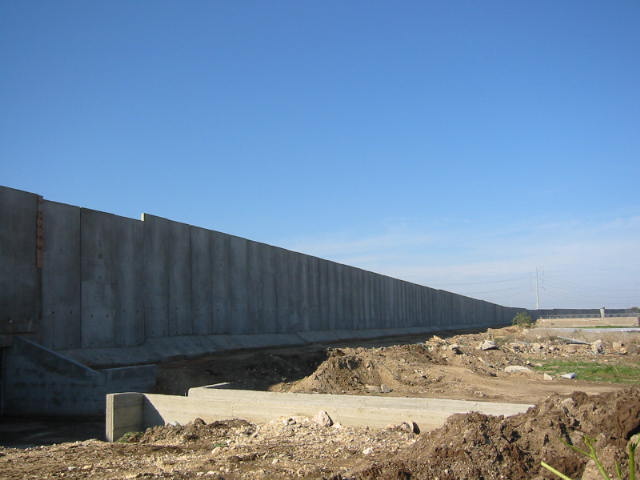
A section of the Israeli "Separation Barrier" at Qalqiliya under construction.

Israeli "Separation Barrier" guard post and watchtower near Qalqiliya.
1.3 million refugees live in Gaza one of the most densely populated
areas of the world. 8000 Israeli "settlers" occupy a third of the land,
control access to much of the water and enjoy a network of roads built
and maintained exclusively for their own
use. Palestian refugees face increasingly severe and often arbitary
restrictions on even local travel.

An Israeli
soldier locks one of the gates in the separation barrier near the town
of Qalqilya, July 2003. The city of Qalqilya and surrounding villages
and towns have been particularly hard hit by the barrier, affecting
some 45,000 residents.
© 2003 Agence France Presse, Text:
Human Rights Watch
 click on the picture for the BBC's picture allery of the
aftermath of the Israeli attack on Rafah.
click on the picture for the BBC's picture allery of the
aftermath of the Israeli attack on Rafah.
Building the "separation barrier" and establishing a no-go zone 300
meters on either side of it has entailed countless gross violations of
Palestinian human rights.
As the
Human Rights
Watch
report "Razing Rafah" that has preoccupied and distressed me today
details, the Israeli administration's mix of punishment, revenge and
reprisal as they created and extended a buffer zone around Rafah meant
over the past four years that 10% of the population, 16,000 people,
lost their homes, being reduced to picking over the rubble of their
homes for traces of their possessions, and for many, living in tents.
Along with vast swathes of gratuitous damage to orchards, greenhouses,
a zoo, and other infrastructure, the armada of American equipped Apache
helicopters, tanks, F16 fighter bombers and armoured D9 Caterpillar
bulldozers, wrecked 298 house in May alone.
According to the Palestinian Central Bureau of
Statistics, 393 residents of the Rafah governorate were killed between
September 29, 2000, and August 31, 2004, including ninety-eight
children under age
eighteen ...
In the same period, Palestinian
armed groups killed ten Israeli soldiers in Rafah. One was killed
while
patrolling the border, in February 2001; four others were killed during
incursions inside the camp. The other five soldiers were killed
on May
12, 2004, when Islamic Jihad fighters destroyed an Israeli armored
vehicle with a
rocket-propelled grenade.
The IDF invoked this latter incident to justify the further expansion
of the
buffer zone through wholesale demolition of homes.
Human Rights Watch
A Distant Mirror?
Faced yet again with the grotesquely disproportionate violence visited
on the Palestians by
the Israeli administration... I wondered again... where had I
previously felt upset in the way I have today?
And I remembered.
In the early 80's while researching
a film about human nature, I visited KD Dachau outside Munich. Even
though it is now mostly an empty space,
it brimmed over with echoes of the pain, hurt, damage, and death
visited on the people unlucky enough to be incarcerated and tormented
there.
"Work makes freedom" reads the sign on the gate which welcomed people
to
Dachau. Industrial strength cynicism. In the museum, what brought tears
was a picture of a woman with a young child also on the wrong side of a
fence,
unmenschen, people
deemed to have lives devoid of value.
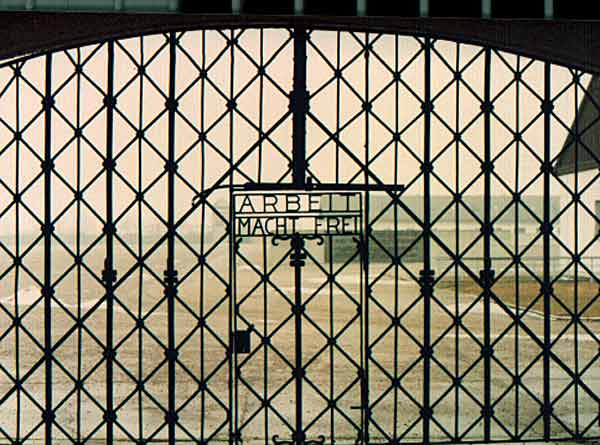
The following day I travelled to KD Mauthausen, one of two dozen
concentration and slave labour camps near Lintz in Austria. What had
began as a film location search became a pilgrimage, as inadvertently,
I arrived
in Linz in the middle of the night. As I sat with others in the station
waiting for morning, armed policemen prevented any of us from
sleeping. No sympathy for weary vulnerability there.
I found KD Mauthausen profoundly moving. Unlike Dachau, so much of it
was still there
that less was left to the imagination. In a
touching re-occupation, as though by the souls of the dead, large parts
of the
camp are encrusted with ceramic images of the mainly Italian but also
Dutch
and Russian people who were killed there. For a sharp lesson in the
what cultures of domination can mean I recommend a visit. Don't miss
the
nearby Schloss, a medieval castle, where the Austrians collected and
gassed all the disabled and 'mentally retarded' children of the Lintz
neighbourhood.
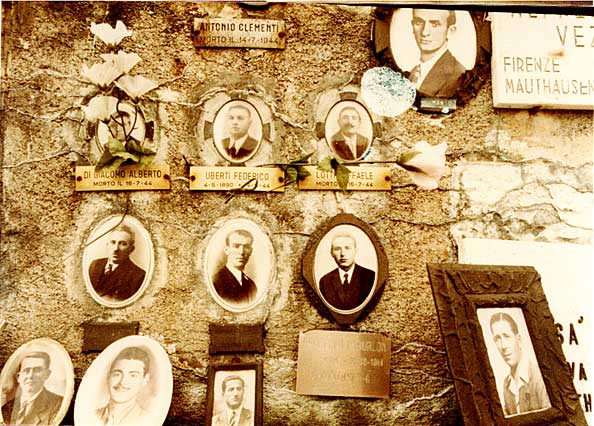
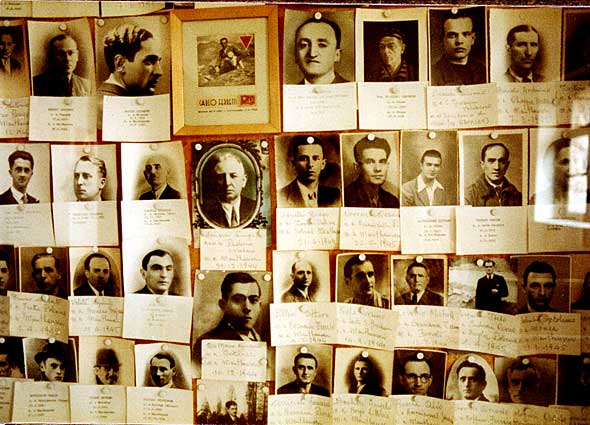 ApartHate
ApartHate
It may seem too big a jump and I am open to being contradicated, but as
I try to look at the big picture, what Israel seems to be doing, albeit
I believe unconsciously, with the separation barrier and its
astonishingly excessive use of force, coupled with abuse of power at check points, etc., in a bizarre inversion of Jewish history... is to turn Gaza into a concentration camp.
Despite its theological claims, even a brief look at its history shows
Israel to be an ill-founded colonial creation, still the occupier of
land stolen from the Palestinian people, who continue to object to this
theft and who seek justice and restitution. Feeling vulnerable
but in deep denial of the origins of their vulnerability, many, but not
all, Israelis, institutionalize their vulnerability, moving it from
being acute to chronic. And in pursuit of a some dream of military
invulnerability, armour themselves so effectively that they can crush
generation after generation of Palestinians while failing to feel for
their
hurt or their sorrow or their distress. This Israeli denial morphs,
rebounding as hate-driven Palestinian martyrdom.
The Israeli administration's response? Apartheit.
How can it be that we tolerate this of Israel? That for so long, and I
include myself, so many people bystand it?
The Spell of Security
For some years, even though I have been burgled and mugged, I have been
very sceptical of the preoccupation in the UK with what I think of as
'security as a form of unconscious impoverishment'. We apparently have
many more security cameras than any other country.
Here below, not far from where I live in London is another armoured
settlement. Is it a prison? A nuclear weapons research
establishment? Or a secure hospital for the mentally challenged? Or a
hugely expensive riverside housing? Guess... Seemingly at war with its
surroundings, it is a 'gated' housing development, one of perhaps
hundreds, even thousands, in the UK.
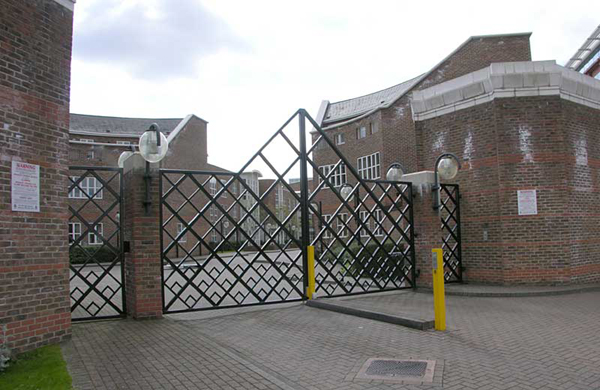
Could it be that our tolerance and bystanding (no economic boycott, no
trade sanctions) of the Israeli's denial
of vulnerability and culpability and their bizarrely excessive
armouring that so damages the Palestinians... arises because the
cultures of domination (and
exclusion) we inhabit have a lot of it in-house?

So far as we entranced by the belief that we need impregnable,
invulnerable, armouring as a way of being in the world (the gate in
this West London housing development even has a guard post) might we
not be replicating in ourselves the denial and armouring (and
psychological ignorance) that feeds and sustains the
Israeli/Palestinian conflict and the supposed clash of cultures
between Islam and the West?
Might this be why bystanding, passive acceptance of the intolerable, is
so common?
Footnote
Feeling something of the pain of a far distant people is no guarantee
of the accuracy of how we respond to it.
In honour of the complexity of the struggles between
vulnerability and armoured denial, and modernity and pre-modern
fundamentalism, I include this link (double-click the image) to a
story about another Wall.
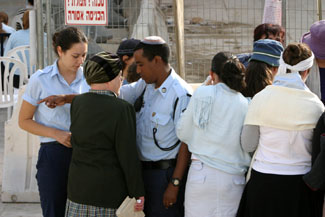 Police try to prevent a woman
from
disturbing Women of the Wall, right,
Police try to prevent a woman
from
disturbing Women of the Wall, right,
while they pray at the Western
Wall in Jerusalem, Oct. 15.
For almost 15 years, Women of the Wall — a prayer group that
includes women from all streams of Judaism — has been struggling to
break the Orthodox hegemony at Judaism’s holiest site, fighting for
both legal and social acceptance, hoping to be able to read from the
Torah, wear tallitot and pray out loud next to the venerable retaining
wall of the Holy Temple.
Their presence challenges an Orthodox tradition that only men are
allowed to take part in these practices... click on the picture to read
more.




















